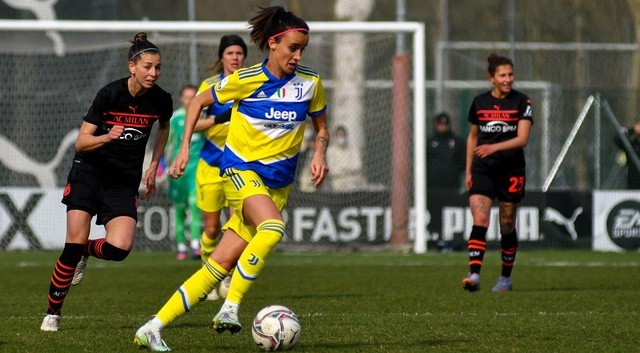The fan-experience is key for new president: “Coming to a game includes every moment, from the minute you leave your house, to the drive to the stadium”
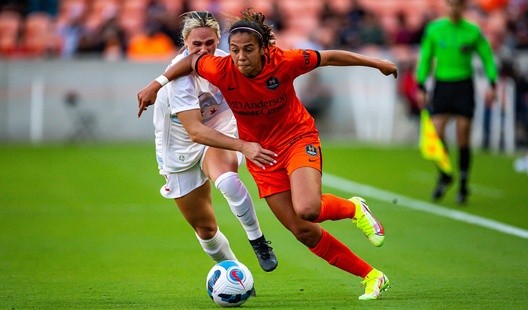
Alamy
Houston Dash have appointed its first ever president. Plans include adding sponsors to double revenue in the next three years. There are 180 full-time staff members across the organization, who also runs the MLS-side Houston Dynamo FC.
Understanding the fan profile and serving up the ultimate in-stadium experience is a key focus to grow the club.
Why it matters: Houston Dash, which sits alongside Houston Dynamo in the MLS, now have the opportunity to build its own voice.
The perspective: Through authenticity, there’s the potential to build lasting fans that can help sustain the club—and the league—for the long-term.
21 April 2022 - 2:53 PM
Jessica O’Neill’s appointment as President of Houston Dash marks a first for the women’s team—and it’s a role she relishes in its unique challenges. O’Neill, who has been in the job since March, has already begun to map out an interesting strategy to grow the club.
“Reach, Revenue, Engagement”is her mantra, she says. This includes programs centered on building a bigger fan base, prioritizing the player experience, and adding significant sponsor dollars.
“I use the phrase ‘Reach, Revenue, Engagement’ quite a bit because when we talk about maximizing the touch points that we have with fans in the market, we want to do that through our reach, our revenue, obviously, and our engagement,” says O’Neill.”
This includes greater focus on the social and digital platforms, as well as in-person programs, and an emphasis on the community at large.
“So it’s thinking about all of those things on the business side,” she adds.
To that end, in mid-March of this year the Dash experienced another first: the club announced a historic sponsorship deal with Chevron. It’s their first exclusive partnership, separate and distinct from sibling Houston Dynamo, which is under the same ownership group and is a Major League Soccer franchise.
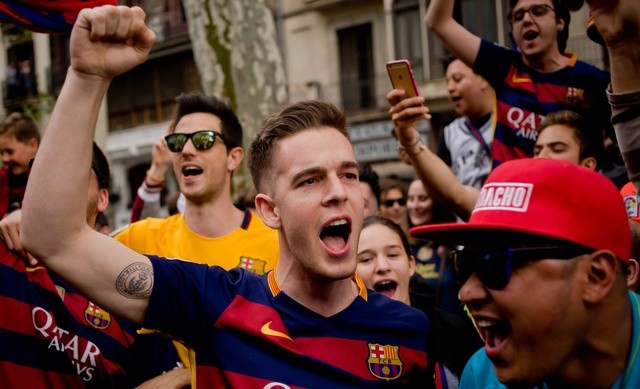
Ex-FC Barcelona executives: Clubs should generate more revenue directly from fans
18 March 2022 - 4:32 PM
Chevron now becomes the Dash’s “Proud Energy Partner” and “Proud Community Partner.” And part of the agreement is community-based. Chevron is providing two soccer clinics for girls 6-12 in mini pitches built by both Houston Dash and Dynamo that are peppered throughout the city. The oil company has also agreed to provide tickets to all clinic participants and their families who want to attend Dash home games during the 2022 season.
This deal, of course, is an important marker in the club’s history. Houston Dash joined the National Women’s Soccer League in 2014. Houston Dynamo & Dash had a changeover in ownership last June when Ted Segal, founder and president of EJS Group, a New York-based real estate development and finance company, became majority shareholder.
Segal shelled out roughly $400 million, according to press reports, in the deal. Mexican business executive and investor Gabriel Brener, who retains a minority stake, was the previous majority owner. Brener initially invested in the club in 2008 and took full control from Anschutz Entertainment Group (AEG) in 2015. Other minority owners include former boxing professional Oscar De La Hoya, energy executive Ben Guill and James Harden, who plays professional basketball for the Philadelphia 76ers.
There are 180 full-time staff members across the organization, including business and technical, and the stadium and training facility.
On the business side, resources are shared extensively between both teams to create efficiencies. These include co branded marketing efforts, sales staff selling both products—and looking for opportunities to create Dash-Dynamo combined assets, particularly for corporate partners, human resources and accounting.
For the Dash, the team currently have 28 players under contract and 27 are full-term, running through all 12 months as per the new Collective Bargaining Agreement. The remaining player is under a National Team Replacement Contract, which is a short-term agreement to replace players who are away on international duty for extended periods.
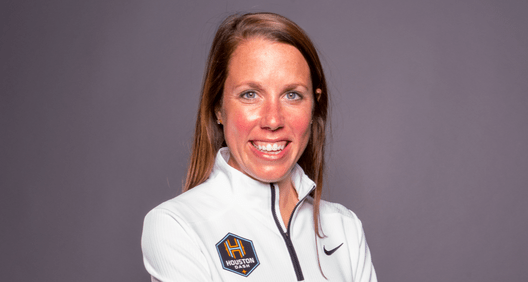
PR | Jessica O'Neill, first ever President of Houston Dash
On the business side, resources are shared extensively between both teams to create efficiencies. These include co branded marketing efforts, sales staff selling both products—and looking for opportunities to create Dash-Dynamo combined assets, particularly for corporate partners, human resources and accounting.
For the Dash, the team currently have 28 players under contract and 27 are full-term, running through all 12 months as per the new Collective Bargaining Agreement. The remaining player is under a National Team Replacement Contract, which is a short-term agreement to replace players who are away on international duty for extended periods.
In her new position, O’Neill reports to John Walker, president of business operations, who was previously overseeing both teams. She is a seasoned sports executive who has worked across the industry, including nine years with the National Football League’s Carolina Panthers. O’Neill spent a year at MLS’s Charlotte FC as director of marketing and communications when the opportunity to join Houston Dash presented itself.
Ramping up sponsorship activities
While O’Neill could not comment on revenue, she says the club is actively seeking out partners locally, nationally and internationally, harnessing Houston’s reputation as a destination for the global community.
And as Chevron is the club's first exclusive partnership, O’Neill would like to see at least two brands sign on per year that are specific to the Dash. The goal with its ramped up sponsorship activities is to double the club’s revenue in the next three years.
“This is a nice season in the Dash,” says O’Neill. “I'd like to go searching for more brands that are specifically looking for this space. We have benefits, obviously, of being a part of a larger organization —having an MLS team, as well. But, we should have at least a couple every year that are specific to the Dash, because of the opportunity that we provide, which is a little bit different than the MLS side.”
O’Neill emphasizes that players are increasingly becoming a part of the conversations with the club’s partnership team on the “support, loyalty and affiliation” they will provide to brands that join them.
She again points to the Chevron deal: “It is community-based, bringing the game to areas where the players interact with young girls who might not have access to training, fields and programming,” she says, adding; “it’s bringing the game to them. And then my favorite part is bringing them to Dash games, and making sure that they can see that playing professional soccer is viable.”
But, it’s the other big piece of the puzzle that O’Neill hopes will be a differentiator for Houston Dash: the goal of offering, essentially, the ultimate fan-going experience.
O’Neill is full of vitality exuding a true passion for being a sports industry executive. She understands well that her place in the world can directly contribute to the joys of what people choose to experience in their personal lives. It’s a responsibility she embraces wholeheartedly.
She has an aura of excitement about her— it’s this rush of feeling at starting life anew in Texas in an industry she committed herself to before beginning a career in it.
O’Neill directs the conversation to Segal, who, in a short period, has made significant changes, ushering in a new era for both Dynamo & Dash.
Segal is quoted on the club’s site: “As we were assuming control of the Dash last year, we recognized that they were long overdue in having dedicated executive leadership reflecting the Dash's importance within the sport of soccer and the Houston community.”
Much of their early conversations centered on Houston itself, the fact that it’s the fourth largest city in the country and one of the most diverse, as strengths that support the Dash. Segal enticed her with growth possibilities for the team, emphasizing this “massive opportunity to capitalize on the size of the market” and the game itself—that which is the most popular in the world.
“When he was speaking about that, it was really hard not to be caught up in it,” she says.
Prioritizing the fan and the player experience
Now, as she immerses herself more deeply into the job, O’Neill prioritizes both the fan and the player experience as areas of focus. Both are intertwined to some extent, working towards the same goal: a live sporting event that will hopefully become a memorable experience.
On the fan side, the critical piece is to bring more people to see Houston Dash games at PNC Stadium. “The biggest strategy right now is getting our entire business team to be on board with the goals that we're setting for our average attendance for the season,” says O’Neill.
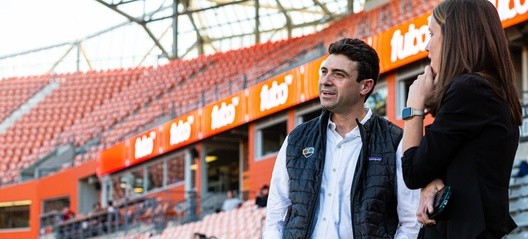
PR | Ted Segal and Jessica O'Neill at PNC Stadium
“Having that be the number one marker of what success looks like for us at the end of the season is what we are striving towards.”
Attracting new fans is one thing. But, then the focus must turn to “how do we present a product and an experience that makes you want to come back again—and then find partners that want to help us do that,” she adds.
The sum of the parts, including ticketing, marketing, content, media—everything stems, according to O’Neill, from what transpires on game days inside the stadium.
“It's not where we want to be right now, so we need to elevate that in order to achieve some other goals,” she says.
O’Neill says a positive experience is marked by the very moment the journey begins en route to the stadium.
“Coming to a game includes every moment, from the minute you leave your house, to the drive to the stadium,” she explains. “As you are approaching, what do you see? Are there fans in the parking lot? Is there something that creates this excitement and anticipation of ‘we're getting close’?”
Obsessive about those little things
What this boils down to is every interaction that somebody has on their way to the stadium—before they reach their seats— impacts how they feel about the in-game experience. It’s the ticket takers, the people on security detail, the lines at the concession stands, the concessions themselves, is there any trash in the stadium, and so on, O’Neill further explains.
“I'm obsessive about those little things, because it can very quickly leave a sour taste in someone's mouth,” she notes.
Houston Dash is also heavily focused on achieving a fun fan atmosphere, so the music, what’s appearing on the jumbotrons, as contributors to this.
But, the hope is that by putting the right pieces in place, the atmosphere will partly become fan-led.
“What I love about soccer is that it doesn't have to be manufactured by the club at all—it can be supporter-led and and be driven organically versus a forced entertainment environment,” says O’Neill.
“So how do we do less of that and enable our supporters to create the atmosphere—we need to build upon that base.”
To do that, O’Neill is spending time at Dash games to understand the profile of people attending matches. She also spends time understanding who they are through social media and makes herself available to the masses should they have any comments—including constructive criticism—on the club’s various marketing efforts. Soccer fans speak up, she finds, when they are being marketed to in a way that doesn't feel right.
Some of what O’Neill has witnessed is a passionate fan base that knows players’ lives inside and out—like family stories and pets names.
“That's an area that's super interesting,” she says. “I have, need and want to engage with that group on a very consistent basis.”
Considering a revenue-sharing model for the team
One of the big attractors to the job was an emphasis on the player experience.
“I truly believe in not taking the next step in a job unless it's something new, or different from what I had been doing, says O’Neill. “The new part for me is the player experience.”
Presently, the business side is examining its current staffing, which has few dedicated Dash resources, and evaluating specifically on the revenue side, new additions that need to be made.
One staff position the club is looking to fill on the team side is a player care coordinator who will serve as a daily point of contact to support the needs of Houston Dash.
"Whether it’s picking somebody up at the airport or meeting grocery store needs it’s just those little things that make a big difference to help support a better experience,” says O’Neill. This is about fostering a healthy environment, which contributes to the overall success of the club.”
On a grander scale, O'Neill would like to explore something along the lines of the revenue sharing model that Angel City FC has created. It works like this: one percent of the net ticketing revenue from all of Angel City’s home regular season NWSL games will be divided equally among players on the ACFC roster who support marketing initiatives to drive ticket sales. Players use their own social media channels for the effort.
While discussions internally have not yet started at Houston Dash, O’Neill says it’s most assuredly a model to build a base from to provide added benefits to its players.
How to challenge and stand apart through authenticity
Her vision for the club is to be the best within the league. For O’Neill, that translates into retaining and recruiting the best talent.
“That's not specific to the players, it’s the coaches, the support staff, the business staff,” she emphasizes.
But, it's also about setting an example across the sporting landscape “of how to challenge and stand apart through authenticity”.
O’Neill believes authenticity is key to the club’s success, and beyond that—the league and the sport overall.
She points to the approachability of the Dash as one example to illustrate her point. When forward Rachel Daly, an English transplant who also plays for England's National Team, is seen at the grocery store bringing the same energy she carries to the pitch, there’s something genuine that fans can relate to in an organic way, explains O’Neill.
Another example: the players sign autographs after each home game, which is an important way to create a lasting connection.
“They all make the rounds, which is amazing to see - even after a loss when you know that must be hard—but they stick it out,” says O’Neill.
“I believe that it's the only way that this sport will grow to the heights that we all know it can. If we do it with an authentic approach…we’re going to elevate together.”
